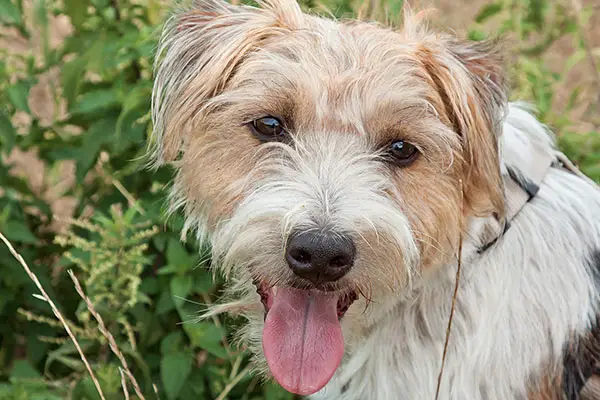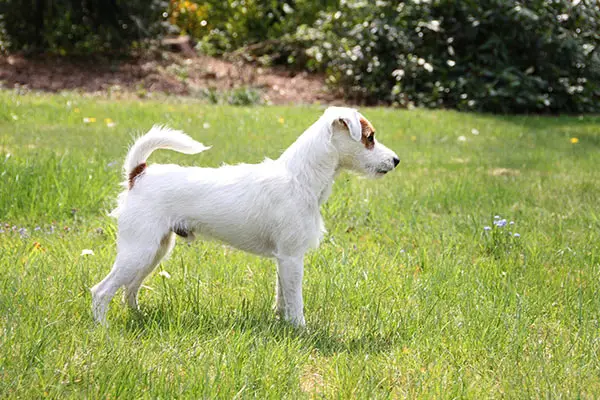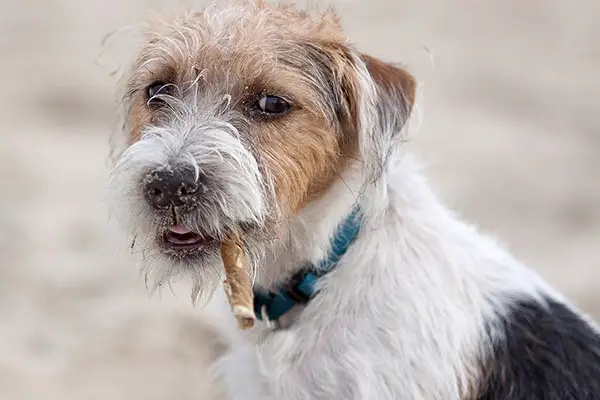Parson Russell Terriers are small and playful dogs that stand at the height of 14 inches. They feature an intelligent expression, a white coat, and well-balanced bodies. The Parson Russell Terrier was originally bred to hunt foxes, so don’t mistake this breed as toys because they’re pretty tough and fearless.

Parson Russell Terrier Statistics
| Dog Breed Group | Terrier |
| Breed Size | Small |
| Height | 14 inches (male); 13 inches (female) |
| Weight | 13-17 pounds |
| Lifespan | 13-15 years |
Parson Russell Terrier Ratings
| Energy level | |
| Exercise needs | |
| Requires attention | |
| Playfulness | |
| Trainability | |
| Shedding | |
| Grooming | |
| Friendly with family | |
| Friendly with kids | |
| Friendly with strangers | |
| Friendly with other dogs | |
| Prey Drive |
Parson Russell Terrier History
Parson Russell Terriers were bred around 1800 England. It all started when John Parson Russell, a hunting enthusiast, wanted to develop a terrier line that can keep up with horses. These dogs should also be small to go to the ground smoothly while pursuing foxes.
All modern Parson Russell Terriers we see today descended from a dog named Trump. The breeding program was so successful that the breed was named after Parson Russell himself.
Though the breed has long been existing, Russell declined to show the breed to any dog shows. It took years before they were recognized by the American Kennel Club in 1997 and was admitted to the Terrier Group in 1998.
Now, it ranks 117th as the most popular dog breed in the US. They might be more uncommon than their Russell Terrier cousins, but for people who have them as companions, these are affectionate dogs.
Parson Russell Terrier Temperament
Parson Russell Terriers are known to be friendly, clever, and athletic dogs. These dogs love action and adventure, so be sure to give them exactly that.
Let them play outdoors, take them out for a walk or run. You can do any activity where he can spend his excess energy. This way, by the time he gets indoors, he’ll be tired and well-behaved. But be sure to keep toys nearby to entertain him.
A bored Parson Russell Terrier can be destructive. These dogs thrive for human companionship and attention, so be sure not to leave them alone for long periods.
Parson Russell Terriers can get along well with children. However, remember to keep close supervision, especially if you have a toddler and tend to misbehave.
These dogs are happy-go-lucky and friendly with strangers or pets they grow up with. However, things can be aggressive with strange dogs, and have tendencies to chase smaller animals and cats.
Early socialization is vital with Parson Russell Terriers. This will help make them more well-rounded so they can better control their feelings towards anything new.
Training can be tiring and challenging, but it’s essential to be patient and gentle. You also need to show firm and consistent leadership if you want him to follow you.

Care Requirements
- Nutrition: Parson Russell Terriers don’t have any special dietary requirements as long as you provide him with a high-quality and well-balanced meal. Get ingredients that are excellent sources of proteins, fats, and carbohydrates, all of which are essential in his growth. Make sure that you only buy high-quality ingredients. Even dog food should be of premium-quality. Your dog’s meal shouldn’t contain any fillers and additives that may have low nutritional value and may cause indigestion. Fruits and vegetables are a great addition to your dog’s meal, as fiber aids well with digestion. Take note if your dog is allergic to any food ingredient and make sure to stay away from it. Overweight dogs are more susceptible to health problems, so be careful with overfeeding your dog. You can always ask your vet for a guide of how much to feed your Parson Russell Terrier.
- Grooming: Parson Russell Terriers come in two coat types: smooth and broken. Both types shed occasionally and require weekly brushing to prevent mats and tangles. Brushing will also help remove excess hair and dirt. Rush coats may require plucking and clipping, but it’s best to let a professional groomer do it. Monthly baths should suffice to keep the Parson Russell Terriers clean. But you might need to do it more frequently if he’s doing a lot of digging. Ears should be cleaned regularly to prevent ear infection. Nails should be trimmed regularly, too, so your dog won’t feel pain and discomfort.
- Exercise: Parson Russell Terriers are playful and fun-loving companion dogs. They have high energies, which means they need lots of daily activities, too. It’s recommended to keep them on-leash when you’re taking him outside for a walk. If you want to let him run loose, make sure that you have a secured yard. You can also create play sessions or activities that you can do together, so he’s happier.
- Health: Parson Russell Terriers are generally healthy dogs. There are no major health conditions that may affect them, but as dog owners, it’s essential to be aware of specific health issues. Lens luxation and patellar luxation are a few minor health concerns to watch out. Other occasional health issues found are glaucoma, ataxia, compulsive behavior, Legg-Calve-Perthes disease, and deafness. Screening tests are recommended for your dog to take. This is so you’ll be able to detect certain conditions early.
- Lifespan: The life expectancy of Parson Russell Terriers is 13-15 years.
Famous Parson Russell Terriers
- Trump: The foundation of the Parson Russell Terrier breed
- Bothy: Travelled to the far ends of the earth with his owners, Ranulph and Ginny Fiennes
Fun Facts about Parson Russell Terriers
- Parson Russell Terriers were bred around 1800 England.
- These dogs were named after their breeder, John Parson Russell.
- They were bred to hunt foxes.
- They are larger than their Russell Terrier counterpart.
- They are more of hunt-focused dogs instead of companion dogs.
- They can jump high and dig well; make sure that your fence is tall and deep enough so he can’t escape.
- They were recognized by the American Kennel Club in 1997.
Check Out Other Terrier Dog Breeds:
Airedale Terrier, American Hairless Terrier, American Staffordshire Terrier, Australian Terrier, Bedlington Terrier, Border Terrier, Bull Terrier, Cairn Terrier, Cesky Terrier, Dandie Dinmont Terriers, Glen of Imaal Terriers, Irish Terrier, Kerry Blue Terrier, Lakeland Terrier, Manchester Terrier, Miniature Bull Terrier, Miniature Schnauzer, Norfolk Terrier, Norwich Terrier, Rat Terrier, Russell Terrier, Scottish Terrier, Sealyham Terriers, Skye Terrier, Smooth Fox Terrier, Soft Coated Wheaten Terrier, Staffordshire Bull Terrier, Welsh Terrier, West Highland White Terrier, Wire Fox Terrier

